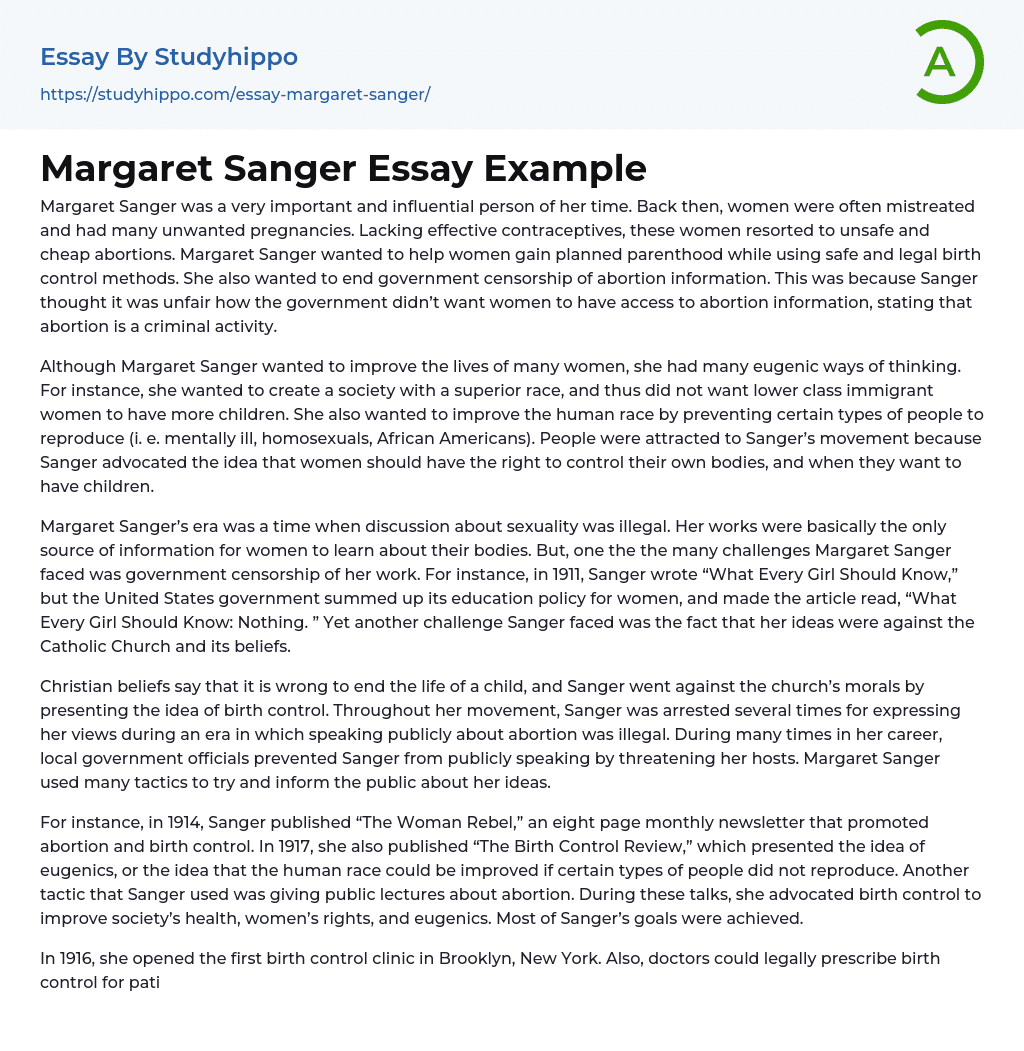During a time when women faced mistreatment and unwanted pregnancies, Margaret Sanger emerged as a prominent advocate for women's rights. In an era devoid of reliable contraceptives, numerous women had no option but to resort to unsafe and inexpensive abortions. However, Sanger sought to empower women by providing them with safe and legal birth control choices, while also confronting government censorship on abortion information. She firmly believed that it was unjust to deny women access to this knowledge and opposed treating abortion as a criminal act.
Although Margaret Sanger sought to improve women's welfare, she held eugenicist beliefs. For instance, she opposed lower-class immigrant women having more children as part of her vision for a society with a superior race. Additionally, Sanger aimed to discourage certain groups, including individuals with mental illnesses, homosexuals, and African Americans, from
...reproducing in order to advance humanity. However, despite these controversial views, Sanger garnered support from those who appreciated her dedication to empowering women in making decisions about their bodies and reproduction.
Margaret Sanger's writings were crucial for women seeking knowledge about their bodies during a time when discussing sexuality was illegal. Despite facing challenges such as government censorship, her works served as the main source of information. In 1911, the United States government modified her article "What Every Girl Should Know" to diminish its educational value by changing the title to "What Every Girl Should Know: Nothing." Sanger also encountered opposition from the Catholic Church due to conflicting beliefs.
Going against Christian beliefs, Margaret Sanger promoted birth control despite it being considered immoral to end a child's life. Despite the illegality of discussing
abortion, Sanger was arrested multiple times for expressing her views and faced suppression from local government officials who threatened her hosts. She employed various tactics to raise awareness about her ideas.
In 1914, Margaret Sanger started "The Woman Rebel," a monthly newsletter that endorsed abortion and birth control. She went on to publish "The Birth Control Review" in 1917, which focused on eugenics and the idea of improving humanity through selective reproduction. Additionally, Sanger delivered public speeches promoting birth control as a means to improve societal health, women's rights, and eugenics. Ultimately, she attained significant success in realizing her goals.
Margaret Sanger founded the first birth control clinic in 1916 in Brooklyn, New York. She also played a crucial role in obtaining legal permission for doctors to prescribe contraception and contributed to the advancement of contraceptive methods. One notable achievement was the development of oral contraceptive pills as an alternative to using a diaphragm, made possible by Gregory Pincus' invention in the 1950s. Today, Sanger's movement remains influential, providing accessible and lawful options for safe birth control that assist women with family planning.
The Planned Parenthood Federation of America (PPFA), a non-profit organization that offers reproductive health services, has had a significant impact. Originally called the American Birth Control League, it later changed its name to PPFA. Margaret Sanger, one of its leaders, advocated for women's freedom to control their bodies and make decisions about motherhood. She emphasized that women cannot be truly free unless they have ownership and control over their own bodies. Additionally, she argued that true freedom for women means having the ability to consciously choose whether or not
to become mothers. This quote by Margaret Sanger underscores her support for women's autonomy regarding their bodies.
Sanger advocated for women's right to decide whether or not to become parents. Another statement made by Margaret Sanger suggested the implementation of strict policies involving sterilization and segregation for individuals whose offspring may inherit objectionable traits or tainted genetics. This reflects her eugenic perspective, where she believes that individuals with unfavorable genetic traits should be sterilized and kept separate from those she deems as "fit."
- Male essays
- Same-Sex Marriage essays
- Masturbation essays
- Sexual Intercourse essays
- Feminism essays
- Animal Rights essays
- Animal Testing essays
- Bullying essays
- Abortion essays
- Abuse essays
- Immigration essays
- Poverty essays
- Human Rights essays
- Inequality essays
- Violence essays
- Torture essays
- Crash essays
- Assault essays
- Racism essays
- Prejudice essays
- Controversial Issue essays
- Cyber Bullying essays
- Women's Suffrage essays
- Women'S Rights essays
- Women Empowerment essays
- Sojourner Truth essays
- Bullying In Schools essays
- Pro Choice essays
- Pro Life essays
- Should Abortion Be Legal essays
- Against abortion essays
- Abortion Debate essays
- Abuse Support essays
- Child Abuse essays
- Alcohol Abuse essays
- Physical Abuse essays
- Sexual Abuse essays
- Substance Abuse essays
- Migration essays
- Human Migration essays
- Illegal Immigration essays
- Immigrants essays
- Refugee essays
- Overpopulation essays
- Homelessness essays
- Hunger essays
- Dumpster Diving essays
- Homelessness In America essays
- Euthanasia essays
- Assisted Suicide essays




